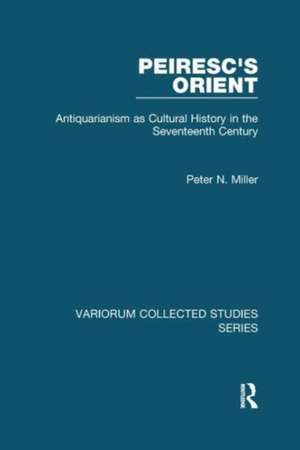Peiresc's Orient: Antiquarianism as Cultural History in the Seventeenth Century: Variorum Collected Studies
Autor Peter N. Milleren Limba Engleză Paperback – 22 mai 2017
Din seria Variorum Collected Studies
-
 Preț: 313.38 lei
Preț: 313.38 lei -
 Preț: 311.41 lei
Preț: 311.41 lei -
 Preț: 299.55 lei
Preț: 299.55 lei -
 Preț: 325.68 lei
Preț: 325.68 lei -
 Preț: 406.12 lei
Preț: 406.12 lei -
 Preț: 311.18 lei
Preț: 311.18 lei -
 Preț: 325.31 lei
Preț: 325.31 lei -
 Preț: 396.01 lei
Preț: 396.01 lei - 9%
 Preț: 1039.89 lei
Preț: 1039.89 lei -
 Preț: 266.20 lei
Preț: 266.20 lei -
 Preț: 343.34 lei
Preț: 343.34 lei - 9%
 Preț: 938.10 lei
Preț: 938.10 lei -
 Preț: 351.48 lei
Preț: 351.48 lei - 9%
 Preț: 938.86 lei
Preț: 938.86 lei -
 Preț: 335.37 lei
Preț: 335.37 lei - 9%
 Preț: 937.14 lei
Preț: 937.14 lei -
 Preț: 351.42 lei
Preț: 351.42 lei -
 Preț: 320.00 lei
Preț: 320.00 lei - 38%
 Preț: 766.84 lei
Preț: 766.84 lei - 23%
 Preț: 315.48 lei
Preț: 315.48 lei - 36%
 Preț: 740.06 lei
Preț: 740.06 lei - 34%
 Preț: 764.20 lei
Preț: 764.20 lei - 39%
 Preț: 684.75 lei
Preț: 684.75 lei - 29%
 Preț: 247.40 lei
Preț: 247.40 lei - 37%
 Preț: 488.89 lei
Preț: 488.89 lei - 38%
 Preț: 766.91 lei
Preț: 766.91 lei - 34%
 Preț: 769.51 lei
Preț: 769.51 lei - 38%
 Preț: 769.85 lei
Preț: 769.85 lei - 36%
 Preț: 823.43 lei
Preț: 823.43 lei - 25%
 Preț: 225.28 lei
Preț: 225.28 lei - 25%
 Preț: 225.54 lei
Preț: 225.54 lei - 34%
 Preț: 767.07 lei
Preț: 767.07 lei - 34%
 Preț: 764.20 lei
Preț: 764.20 lei - 34%
 Preț: 736.38 lei
Preț: 736.38 lei - 34%
 Preț: 738.43 lei
Preț: 738.43 lei - 25%
 Preț: 226.52 lei
Preț: 226.52 lei - 33%
 Preț: 491.66 lei
Preț: 491.66 lei - 34%
 Preț: 485.78 lei
Preț: 485.78 lei - 34%
 Preț: 485.78 lei
Preț: 485.78 lei - 38%
 Preț: 766.34 lei
Preț: 766.34 lei - 36%
 Preț: 739.17 lei
Preț: 739.17 lei - 31%
 Preț: 473.94 lei
Preț: 473.94 lei - 18%
 Preț: 843.63 lei
Preț: 843.63 lei - 38%
 Preț: 774.91 lei
Preț: 774.91 lei - 38%
 Preț: 769.92 lei
Preț: 769.92 lei - 34%
 Preț: 764.20 lei
Preț: 764.20 lei - 50%
 Preț: 488.81 lei
Preț: 488.81 lei - 36%
 Preț: 488.49 lei
Preț: 488.49 lei - 34%
 Preț: 769.10 lei
Preț: 769.10 lei - 38%
 Preț: 766.99 lei
Preț: 766.99 lei
Preț: 304.66 lei
Preț vechi: 351.71 lei
-13% Nou
Puncte Express: 457
Preț estimativ în valută:
58.30€ • 62.34$ • 48.61£
58.30€ • 62.34$ • 48.61£
Carte tipărită la comandă
Livrare economică 18 aprilie-02 mai
Preluare comenzi: 021 569.72.76
Specificații
ISBN-13: 9781138110298
ISBN-10: 1138110299
Pagini: 372
Dimensiuni: 152 x 229 x 25 mm
Greutate: 0.7 kg
Ediția:1
Editura: Taylor & Francis
Colecția Routledge
Seria Variorum Collected Studies
Locul publicării:Oxford, United Kingdom
ISBN-10: 1138110299
Pagini: 372
Dimensiuni: 152 x 229 x 25 mm
Greutate: 0.7 kg
Ediția:1
Editura: Taylor & Francis
Colecția Routledge
Seria Variorum Collected Studies
Locul publicării:Oxford, United Kingdom
Cuprins
Contents: Introduction: Peiresc and history; Comparison: The antiquary's art of comparison: Peiresc and Abraxas; Paganism: Taking Paganism seriously: anthropology and antiquarianism in early 17th-century histories of religion; Arabic: Peiresc and the study of Islamic coins in the early 17th century; Samaritan I: An antiquary between philology and history: Peiresc and the Samaritans; Samaritan II: A philologist, a traveller and an antiquary rediscover the Samaritans in 17th-century Paris, Rome and Aix: Jean Morin, Pietro della Valle and N.-C. Fabri de Peiresc; Hebrew: The mechanics of Christian-Jewish intellectual collaboration in 17th-century Provence: N.-C. Fabri de Peiresc and Saloman Azubi; Coptic: Copts and scholars: Athanasius Kircher in Peiresc's republic of letters; North Africa: Peiresc in Africa: arm-chair anthropology in the early 17th century; West Africa: History of religion becomes ethnology: some evidence from Peiresc's Africa; East Africa: Peiresc's Ethiopia: how? And why?; Conclusion: Oriental studies and orientalism; Index.
Notă biografică
Peter N. Miller is Dean and Professor of Cultural History, Bard Graduate Center, New York, USA.
Recenzii
'Miller has served Peiresc well ...' Renaissance Quarterly 'Miller analyzes with great sensitivity evidence from his extensive correspondence and study-notes to reveal the antiquarian's habits of mind and scholarly practices.' Journal of Early Modern History
Descriere
The ten essays published in this volume were written over the space of a decade, but they were conceived from the start as a coherent whole, presenting Peiresc's study of discrete languages and literatures of the Near East and North Africa. For Peiresc the student of the Classical past, this described the eastern and southern space in which the Greeks and Romans lived and strove. For Peiresc the Christian, this was the world of the Bible that impacted upon the Greeks and Romans. And for Peiresc of the Mediterranean (for he was born in Aix, spent much time in Marseille, and lived outside of the region for only 6 of his 57 years), this was the territory that his friends and colleagues sailed to, lived in and, usually, came back from. The convergence of these axes in the life of one man, and a man of singular intellectual power and charm whose vast personal paper arsenal had survived, made this such a compelling project.
